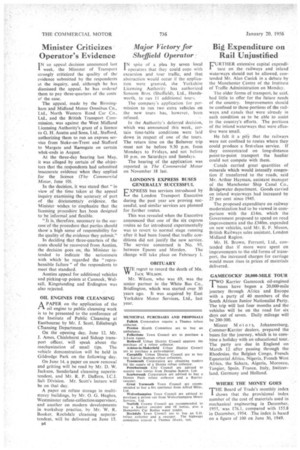Big Expenditure on Rail Unjustified F URTHER extensive capital expenditure on
Page 38

If you've noticed an error in this article please click here to report it so we can fix it.
the railways and inland waterways should not be allowed, contended Mr. Alan Cusick in a debate by the Manchester Centre of the Institute of Traffic Administration on Monday.
The older forms of transport, he said, had little to offer for the future needs of the country. Improvements should be confined to those portions of the railways and canals that were already in such condition as to be able to assist in the country's efforts. The portions of the inland waterways that were effective were small.
He felt it a pity that the railways were not confined to routes where they could produce a first-class service. If they concentrated on long-distance point-to-point transport the haulier could not compete with them.
Canals carried great quantities of minerals which would intensify congestion if transferred to the roads, said Mr. Arthur Hayman, assistant manager of the Manchester Ship Canal. Co., Bridgewater department. Goods carried on inland waterways had increased by 25 per cent since 1945.
The proposed expenditure on railway modernization had to be viewed in comparison with the £14m. which the Government proposed to spend on road improvements and the f340m. expended on new vehicles, said Mr. E. F. Mason, British Railways sales assistant, London Midland Region.
Mr. H. Brown, Ferranti, Ltd., contended that if more were spent on improvements to the old forms of transport, the increased charges for carriage would mean rises in prices of materials delivered.
GAMECOCKS' 20,000-MILE TOUR 'TWO Karrier Gamecock oil-engined I buses have begun a 20,000-mile journey through Africa and Europe with a party of 40 members of the South African Junior Nationalist Party. The trip will last four months and the vehicles will be on the road for six days out of seven. Daily mileage will be 200-300.
Mincer Motor s, Johannesburg, Commer-Karrier dealers, prepared the buses for the journey, which is to combine a holiday with an educational tour. The party are due in England on March 12 after passing through the Rhodesias, the Belgian Congo, French Equatorial Africa, Nigeria, French West Africa, the Sahara, Algeria, Morocco, Tangier, Spain, France, Italy, Switzerland, Germany and Holland.
WHERE THE MONEY GOES
THE Board of Trade's monthly index shows that the provisional index number of the cost of materials used in mechanical engineering in December, 1955, was 176.1. compared with 155.8 in December, 1954. The index is based on a figure of 100 on June 30, 1949.




































































































